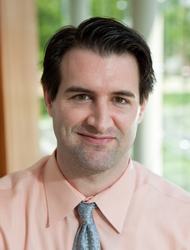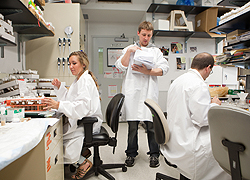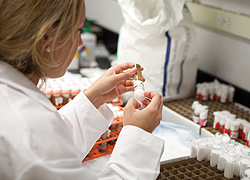

Juggling Research and Medicine
Of Flies, Mice & Men: A Student Balances Lab Work, School and Family
Medical school is time-consuming enough, but don’t tell that to Sean McBride. As the Einstein student finalized his preparations to graduate, he was still overseeing a lab that conducts innovative studies in genetics and its effects on cognition and memory. Having earned an M.D. and a Ph.D., he’ll now begin a residency in psychiatry at the University of Pennsylvania, where he’ll also continue his research into the workings of the brain. He also recently became a father for the first time.

Sean McBride, M.D., Ph.D. “I’ve never seen a student with so much motivation, creativity and fearlessness,” said Dr. Tom McDonald, professor of molecular pharmacology at Einstein, and Dr. McBride’s Einstein mentor. “He has true scientific curiosity and is always thinking of new ways to experimentally tackle important biomedical questions. And, he has so many new ideas that he needs an army of scientists to carry them out. His enthusiasm is contagious.”
Medical research wasn’t even on Dr. McBride’s radar when he arrived at Swarthmore College, near his Cape May, New Jersey hometown, in 1992. “I wasn’t really sure what I wanted to do. I was interested in literature, but also in biology,” he said. Eventually, inspired by several mentors, he became a biology major.
“Dr. John Jenkins, my genetics professor, and Dr. Kathleen Siwicki, my neuroscience professor, introduced me to fly research,” he recalled. At the time, Dr. Siwicki primarily did circadian rhythm research. Because I was more interested in cognition, she got me in touch with experts whose work focused on that and we were able to conduct learning and memory work in her Swarthmore laboratory.”
After graduating, Dr. McBride continued his education at the University of Pennsylvania, where he also worked as a lab technician. Then, in 2001, he entered Einstein’s Medical Scientist Training Program to begin his M.D.-Ph.D. studies. He focused his thesis on modeling cognitive disorders in Drosophila (commonly known as fruit flies).

Foundation grants provide support for
several technicians and a research fellow to
work in the lab. Dr. McDonald, who had interviewed Dr. McBride when he applied to Einstein, arranged for the temporary loan of a small lab space within the department of molecular pharmacology through the graciousness of the departmental chairs Dr. Susan Horwitz and Dr. Charles Rubin. Although Dr. McBride’s name is on the door above a photo of a fruit fly, he refers to the space as “the Drosophila wing of the McDonald lab.” And with Dr. McDonald’s support, he has secured several foundation grants from the FRAXA Research Foundation and Autism Speaks that have allowed him to pay for several technicians and a research fellow to assist in the lab.
This was fortunate since, at the same time, Dr. McBride also had clerkships in pediatrics, medicine and OB-GYN to fulfill the medical portion of his studies. While acknowledging that the juggling of work was extremely difficult, he said, “I’ve been blessed to have such tremendous support. In addition to Dr. McDonald, the deans of student affairs — Dr. Baum and Dr. Katz — were amazing and helped me find a balance. So when I was on the clerkships, I focused on those, but before each one I set it up so that everyone in the lab had a detailed game plan of exactly what experiments they’d be doing.”
Dr. McBride and his team have been studying Fragile X Syndrome, a genetic defect that is one of the common inherited forms of intellectual disability and is associated with autism. On one recent afternoon, a member of the lab was observing several round containers, each with a pair of flies, as he timed their behavior with stopwatches.
“People are always surprised that you can study memory in flies, but there are about 100 different ways,” explained Dr. McBride. In this case, by observing Fragile X flies and their changes in courtship behavior, Dr. McBride and his colleagues have been able to modify the flies’ memory using drug therapy, including lithium. (They also have done similar studies with mice.) Their research offers insights into unlocking mysteries of pathologic states of cognition including intellectual disability, autism and Alzheimer’s disease.

Observing the courtship of fruit fliesAs he has juggled his multiple roles, Dr. McBride’s life has indeed been full. In 2007, he received top recognition for his research as a recipient of a Julius Marmur Award, an honor bestowed on a select few Einstein graduate students each year. He married Catherine Choi — a Drexel M.D.-Ph.D. student whom he had met at Swarthmore and with whom he had been conducting research since his time in Dr. Siwicki’s Lab — in the fall of the following year. And the couple’s daughter, Eliana, was born this March, just as the couple learned where they would be headed for residency.
As Dr. McBride and Dr. Choi move on to their residencies (he at University of Pennsylvania and she at Drexel, in dermatology), plans are in place for his Einstein laboratory. “The studies we’re conducting will continue for the next year,” he explained. “The motto we have in the lab is ‘from flies to mice to men.’ Using the power of genetics in Drosophila, we have sought to understand what’s going on at the molecular level in the brain, identify novel drug targets and then test those targets, first in mice and then in people.”
He continued, “Ultimately, I hope to see patients for some amount of time and then spend most of my time conducting research.”
But first, he has to pack up his apartment, get his wife and daughter moved into a new home in Philadelphia, and get the place baby-proofed.
Posted on: Wednesday, June 2, 2010


